Why Do Smart People Get Stuck While Everyone Else Moves Forward?
The thinking trap that's stealing your time (and how to escape it)
Hi Kwik Brain,
Read this if you’ve spent more time planning your project than executing it. You research endlessly but struggle to act. Your intelligence feels like a curse, not a gift.
You’ll learn why high IQ actually blocks action, the science behind overthinking, and three tactical fixes you can use before your next meeting.
Your brain is brilliant.
That’s the problem.
Last Monday, you probably spent two hours researching the perfect solution to a problem that needed thirty minutes of messy action. You built another spreadsheet. Drafted another strategy doc. Scheduled another alignment meeting.
The smarter you are, the more likely you are to get stuck in this loop. Research shows that traditional intelligence measurements fail to capture “acting intelligently” in the real world. IQ tests reward thinking. Real life rewards doing.
Most corporate professionals face the same trap. Your intelligence becomes a defence mechanism against the discomfort of imperfect action.
The overthinking epidemic
Here’s what Monday morning looks like for most knowledge workers:
Check email. Notice twelve items that need “quick research” before responding. Open fifteen tabs. Read three articles. Bookmark seven more. It’s 11am and you’ve accomplished nothing.
That promotion-worthy idea? Still sitting in your notes app from six months ago. Not because you lack ability. Because you’re waiting for the perfect moment, the complete plan, the foolproof strategy.
Studies demonstrate something disturbing: people keep gathering information long after it stops being useful. We treat research like a safety blanket. More data feels productive. It’s not.
Your brain tricks you into believing that thinking equals progress.
Why smart people get paralysed
Intelligence comes with a hidden cost. The more capable you are of imagining outcomes, the more you see what could go wrong.
Research on social anxiety and overthinking shows that excessive deliberation actually hampers performance despite strong cognitive ability. Your brain’s gift for analysis becomes its greatest liability.
Three patterns keep you stuck:
The uncertainty trap. You can envision fifteen different scenarios. Each requires more research to evaluate properly. So you research. And research. And never decide.
Performer atrophy. You’ve become brilliant at strategy. Terrible at execution. The strategist in your head drowns out the performer. Planning feels safer than doing.
Profitable paralysis. Here’s the twisted part: overthinking feels good. It mimics productivity without risk. You get the dopamine hit of “working” without the vulnerability of shipping something imperfect.
One academic review of decision-making research found that highly intelligent people are more prone to reasoning biases and inaction due to overconfidence and perfectionism.
Your intelligence isn’t broken. It’s just operating without constraints.
Three fixes you can implement today
Stop treating this like another problem to analyse. Here’s what actually works.
The two-document rule
Before you open that tenth tab, ask yourself: have I consulted two legitimate sources already?
If yes, stop researching. Decide with what you have.
Information overload research confirms what you already suspect: more data doesn’t improve decisions past a certain point. It just delays them.
Most decisions in your job don’t require a comprehensive analysis. They require adequate information and the courage to move forward.
Two sources. Then action. That’s the rule.
The rough draft mandate
Ship something messy by lunch today.
Not next week. Not when you’ve “refined the approach.” Today.
Pick the smallest unit of work you can complete. A rough email. A draft slide. A prototype so ugly it makes you wince. Then send it to one person for feedback.
Research on cognitive control shows that excessive goal-focused thinking at the cost of spontaneity blocks flexible action. You need to break the pattern physically, not intellectually.
Your “good enough” work is probably better than 80% of what crosses your desk anyway. Stop aiming for perfect. Aim for done.
The decision timer
Any decision with less than £1,000 impact gets five minutes. Maximum.
Where to grab lunch? Five minutes. Which template to use? Five minutes. Whether to approve that minor budget request? Five minutes.
Set a literal timer. When it goes off, you choose. Even if the choice feels incomplete.
Studies on decision-making consistently show that fear of mistakes and information overload lead to indecision among intelligent individuals. The antidote isn’t better analysis. It’s artificial constraints.
High-stakes decisions deserve more time. But you’re probably applying high-stakes thinking to low-stakes choices. That’s where your hours disappear.
The Monday morning test
Here’s how you know if you’re trapped: look at your calendar from last week.
How many hours did you spend in planning meetings? How many creating actual deliverables?
If the ratio is worse than 1:3, your overthinking costs you more than mistakes ever would.
Academic research now uses computational models to demonstrate “analysis paralysis” as a measurable phenomenon. Systems, like people, can over-reason at the expense of action.
The solution isn’t to think less. It’s to act more.
Your intelligence is a tool. Right now, you’re using a scalpel to dig a ditch. Wrong tool for the job. Execution doesn’t require the same rigour as analysis. It requires different muscles entirely.
What changes this week
Stop reading about productivity. Stop planning your planning. Stop waiting for the perfect moment.
Open your task list right now. Pick one item that you’ve been “researching” for more than a week. Apply the two-document rule. Set a five-minute timer. Ship a rough draft before your next meeting.
One messy action beats ten perfect plans.
Your brain’s capability to imagine every outcome isn’t a superpower if you never move. It’s just an expensive way to stay exactly where you are.
Monday morning is waiting. What’s the first imperfect thing you’ll actually ship?
How did this article land for you?
Reply and let me know which pattern you recognised most in your own work. I read every response.
Hi Kwik Brain,
Read this if you’ve spent more time planning your project than executing it. You research endlessly but struggle to act. Your intelligence feels like a curse, not a gift.
You’ll learn why high IQ actually blocks action, the science behind overthinking, and three tactical fixes you can use before your next meeting.
Your brain is brilliant.
That’s the problem.
Last Monday, you probably spent two hours researching the perfect solution to a problem that needed thirty minutes of messy action. You built another spreadsheet. Drafted another strategy doc. Scheduled another alignment meeting.
The smarter you are, the more likely you are to get stuck in this loop. Research shows that traditional intelligence measurements fail to capture “acting intelligently” in the real world. IQ tests reward thinking. Real life rewards doing.
Most corporate professionals face the same trap. Your intelligence becomes a defence mechanism against the discomfort of imperfect action.
The overthinking epidemic
Here’s what Monday morning looks like for most knowledge workers:
Check email. Notice twelve items that need “quick research” before responding. Open fifteen tabs. Read three articles. Bookmark seven more. It’s 11am and you’ve accomplished nothing.
That promotion-worthy idea? Still sitting in your notes app from six months ago. Not because you lack ability. Because you’re waiting for the perfect moment, the complete plan, the foolproof strategy.
Studies demonstrate something disturbing: people keep gathering information long after it stops being useful. We treat research like a safety blanket. More data feels productive. It’s not.
Your brain tricks you into believing that thinking equals progress.
Why smart people get paralysed
Intelligence comes with a hidden cost. The more capable you are of imagining outcomes, the more you see what could go wrong.
Research on social anxiety and overthinking shows that excessive deliberation actually hampers performance despite strong cognitive ability. Your brain’s gift for analysis becomes its greatest liability.
Three patterns keep you stuck:
The uncertainty trap. You can envision fifteen different scenarios. Each requires more research to evaluate properly. So you research. And research. And never decide.
Performer atrophy. You’ve become brilliant at strategy. Terrible at execution. The strategist in your head drowns out the performer. Planning feels safer than doing.
Profitable paralysis. Here’s the twisted part: overthinking feels good. It mimics productivity without risk. You get the dopamine hit of “working” without the vulnerability of shipping something imperfect.
One academic review of decision-making research found that highly intelligent people are more prone to reasoning biases and inaction due to overconfidence and perfectionism.
Your intelligence isn’t broken. It’s just operating without constraints.
Three fixes you can implement today
Stop treating this like another problem to analyse. Here’s what actually works.
The two-document rule
Before you open that tenth tab, ask yourself: have I consulted two legitimate sources already?
If yes, stop researching. Decide with what you have.
Information overload research confirms what you already suspect: more data doesn’t improve decisions past a certain point. It just delays them.
Most decisions in your job don’t require a comprehensive analysis. They require adequate information and the courage to move forward.
Two sources. Then action. That’s the rule.
The rough draft mandate
Ship something messy by lunch today.
Not next week. Not when you’ve “refined the approach.” Today.
Pick the smallest unit of work you can complete. A rough email. A draft slide. A prototype so ugly it makes you wince. Then send it to one person for feedback.
Research on cognitive control shows that excessive goal-focused thinking at the cost of spontaneity blocks flexible action. You need to break the pattern physically, not intellectually.
Your “good enough” work is probably better than 80% of what crosses your desk anyway. Stop aiming for perfect. Aim for done.
The decision timer
Any decision with less than £1,000 impact gets five minutes. Maximum.
Where to grab lunch? Five minutes. Which template to use? Five minutes. Whether to approve that minor budget request? Five minutes.
Set a literal timer. When it goes off, you choose. Even if the choice feels incomplete.
Studies on decision-making consistently show that fear of mistakes and information overload lead to indecision among intelligent individuals. The antidote isn’t better analysis. It’s artificial constraints.
High-stakes decisions deserve more time. But you’re probably applying high-stakes thinking to low-stakes choices. That’s where your hours disappear.
The Monday morning test
Here’s how you know if you’re trapped: look at your calendar from last week.
How many hours did you spend in planning meetings? How many creating actual deliverables?
If the ratio is worse than 1:3, your overthinking costs you more than mistakes ever would.
Academic research now uses computational models to demonstrate “analysis paralysis” as a measurable phenomenon. Systems, like people, can over-reason at the expense of action.
The solution isn’t to think less. It’s to act more.
Your intelligence is a tool. Right now, you’re using a scalpel to dig a ditch. Wrong tool for the job. Execution doesn’t require the same rigour as analysis. It requires different muscles entirely.
What changes this week
Stop reading about productivity. Stop planning your planning. Stop waiting for the perfect moment.
Open your task list right now. Pick one item that you’ve been “researching” for more than a week. Apply the two-document rule. Set a five-minute timer. Ship a rough draft before your next meeting.
One messy action beats ten perfect plans.
Your brain’s capability to imagine every outcome isn’t a superpower if you never move. It’s just an expensive way to stay exactly where you are.
Monday morning is waiting. What’s the first imperfect thing you’ll actually ship?
How did this article land for you?
Reply and let me know which pattern you recognised most in your own work. I read every response.



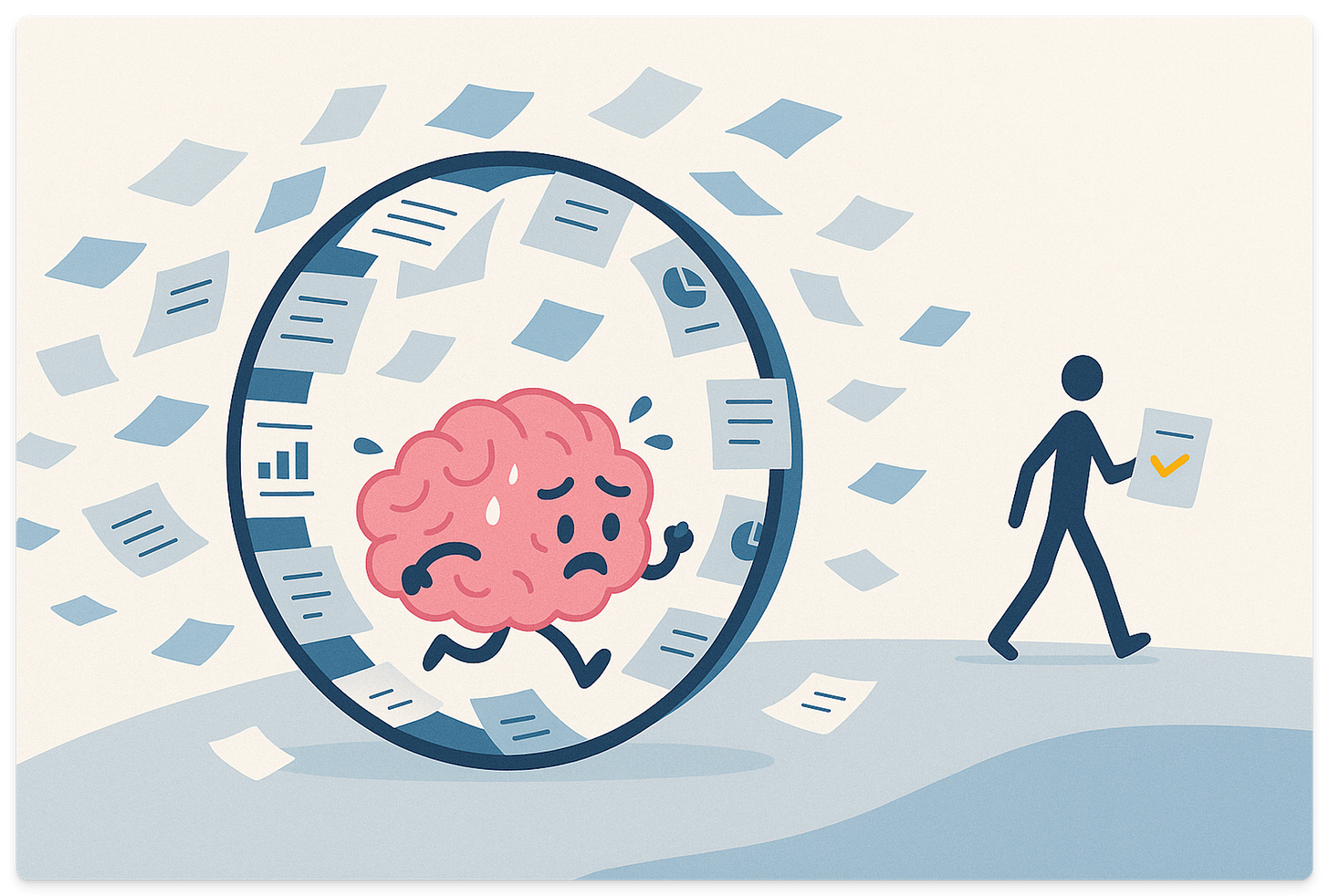
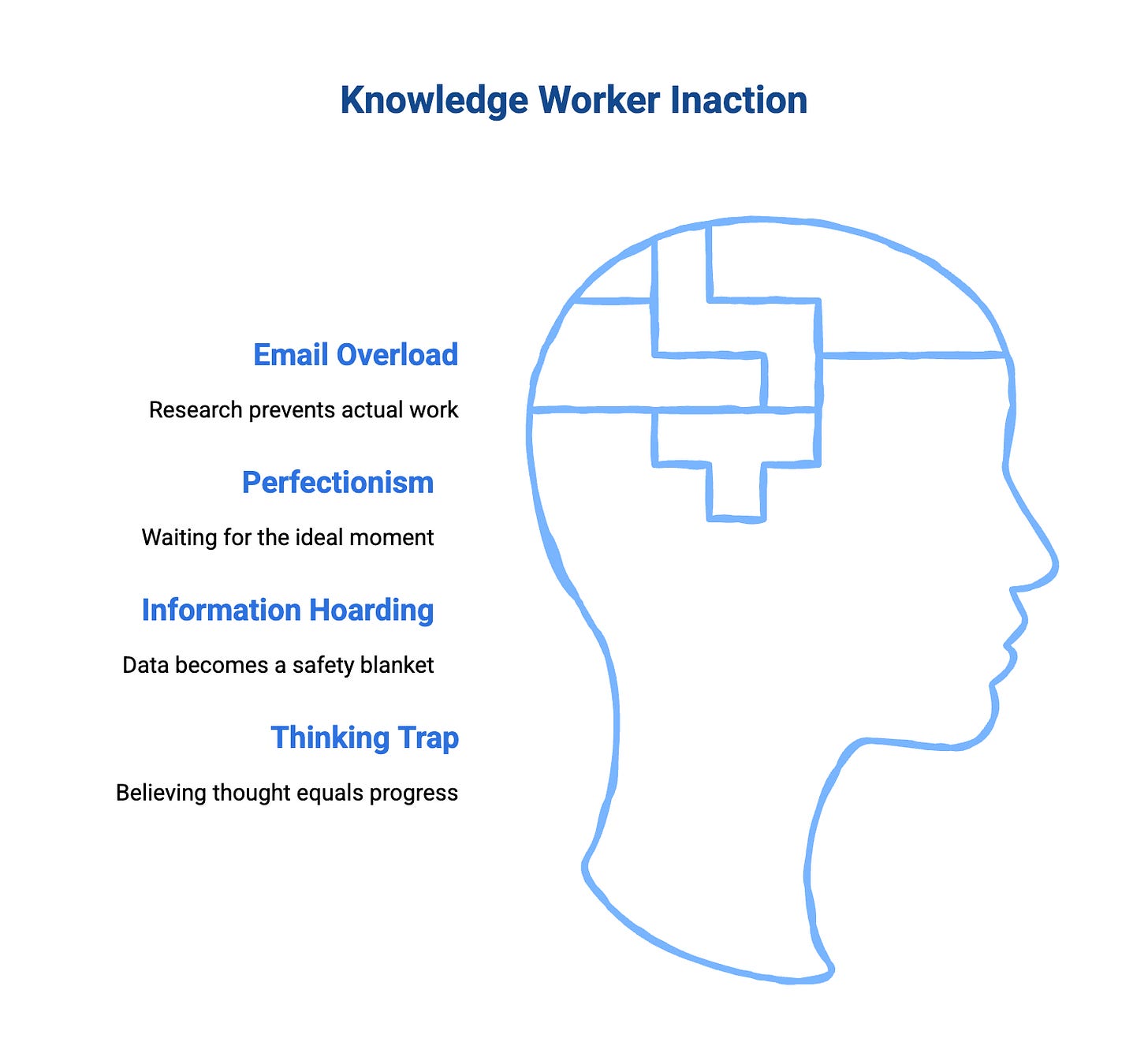
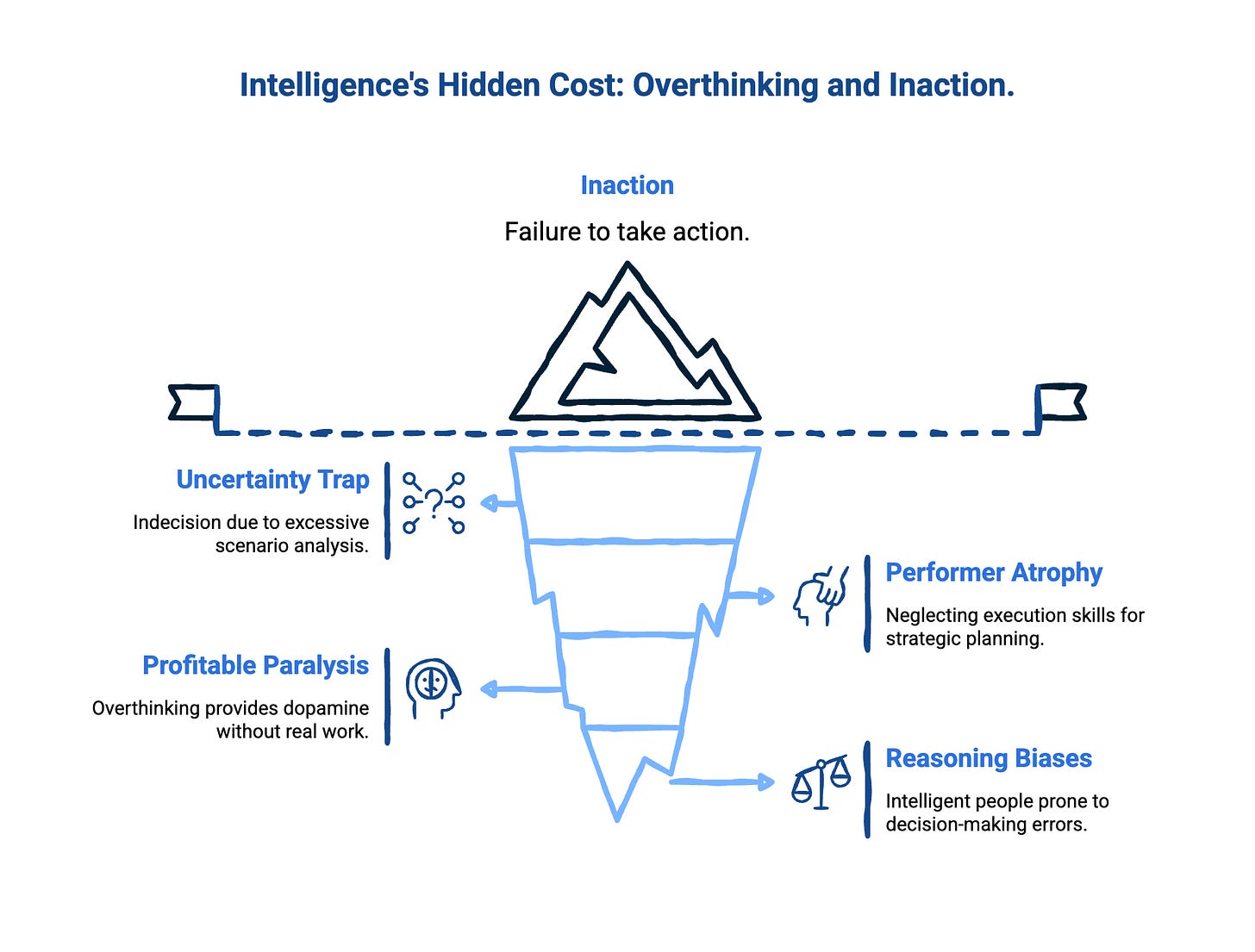
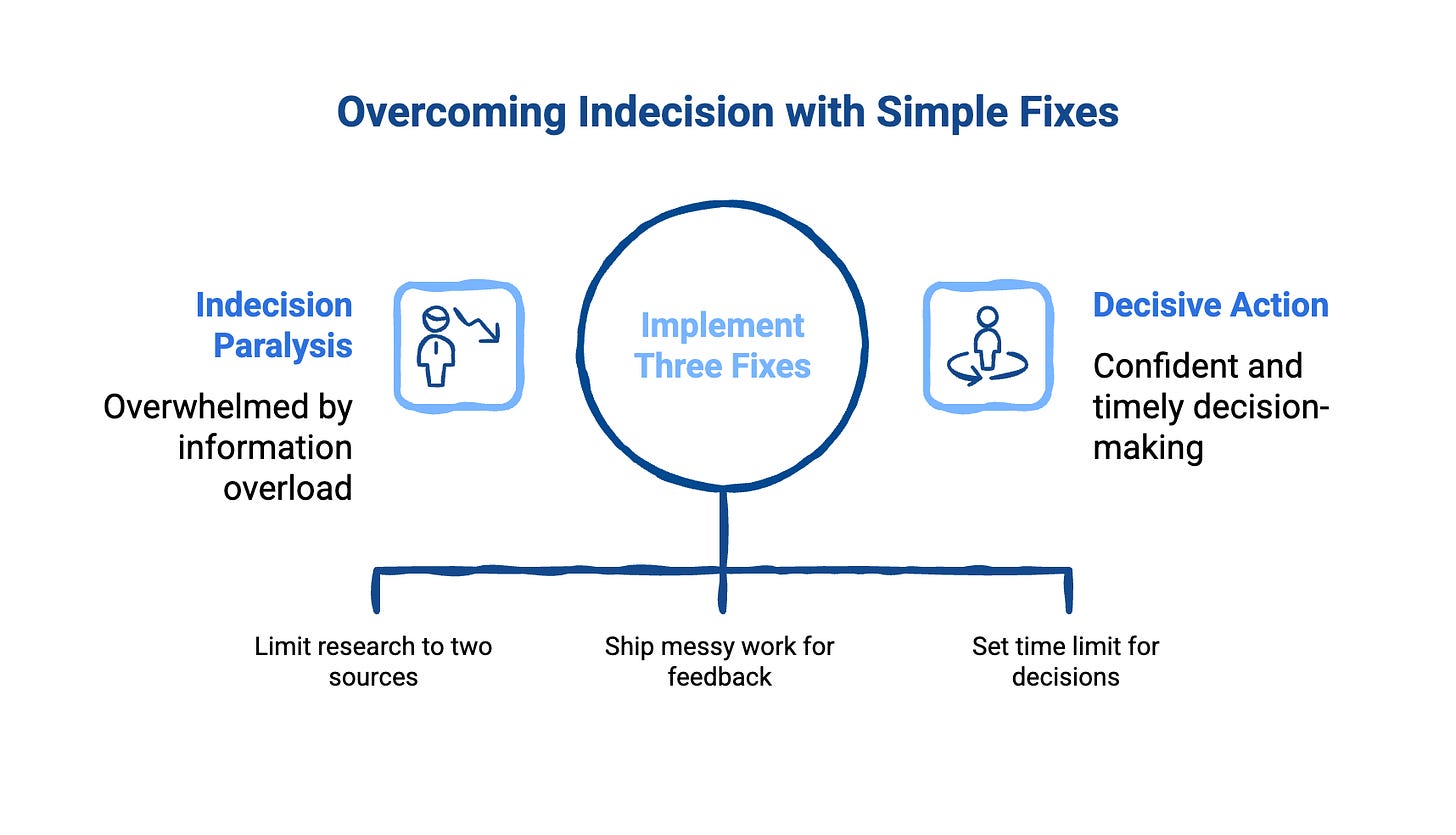
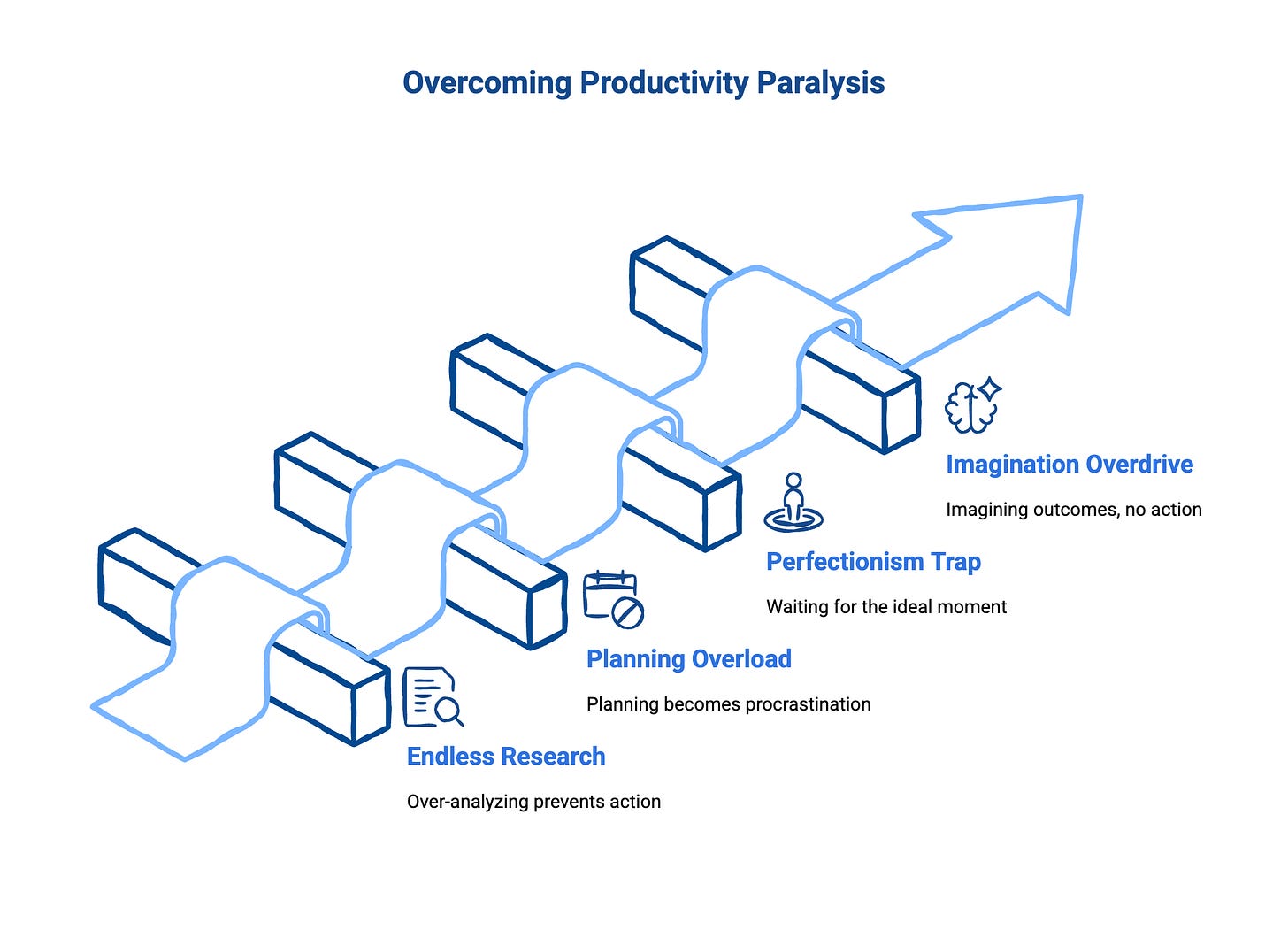

That was a great read to get my Monday started - no more than 5 min per less than 1k decision is going to be the biggest game changer for me this week!
I am retired, but the same intelligence still clogs the system, preventing meaningful progress. I am a Toastmaster seeking the coveted Distinguished Toastmaster certification, so I am researching speaking, writing club reviews, and suggesting improvements, etc. Overthinking has been a problem in the past, but using my calendar has helped a lot. This information is worthy of sharing with my fellow Toastmasters in a speech. Thanks, Jim!